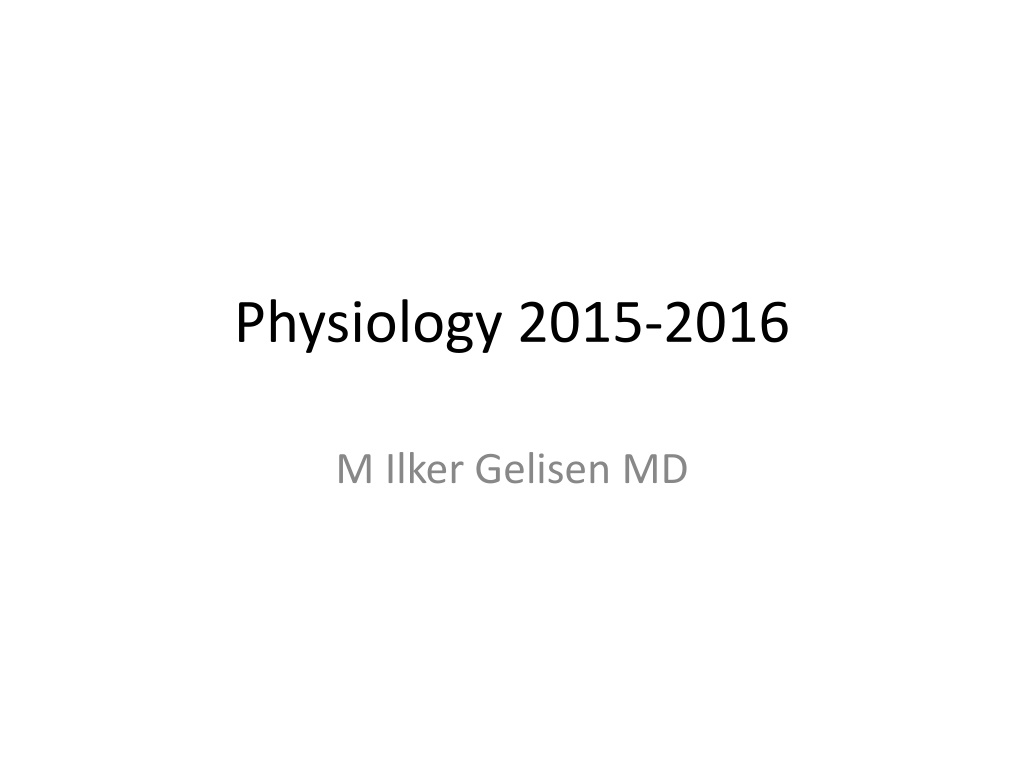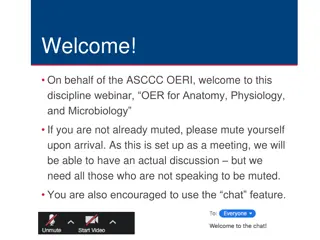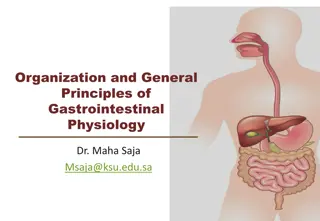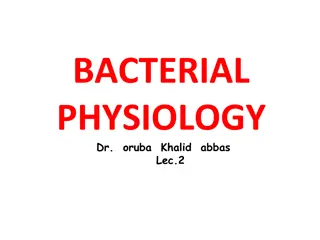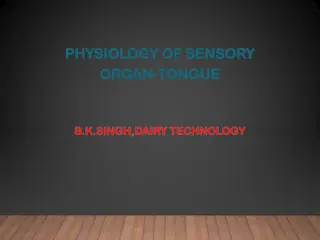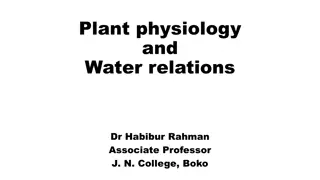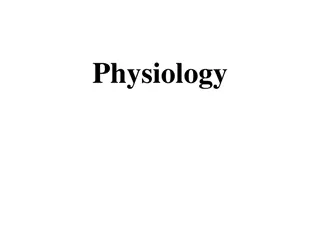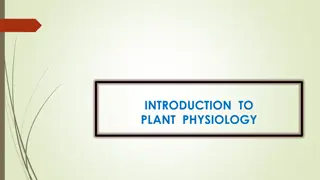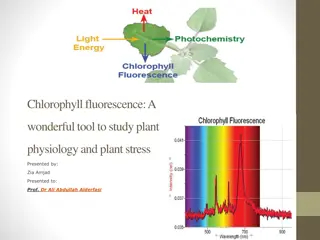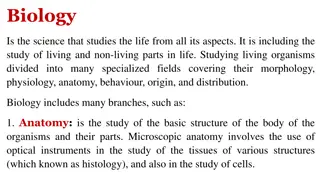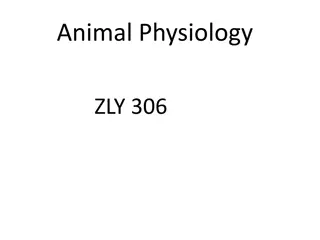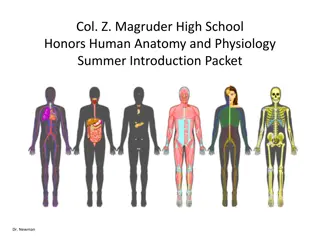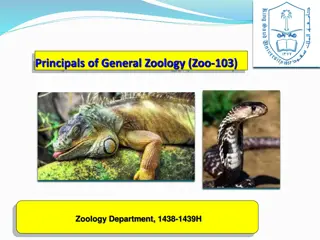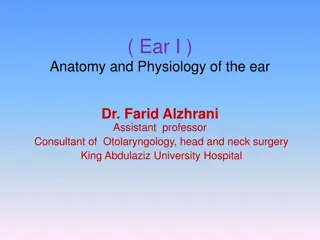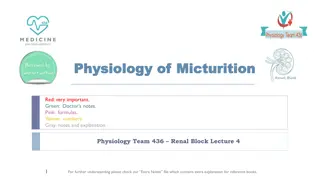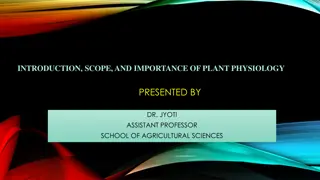Understanding Physiology: A Comprehensive Overview and Study Guide
The study of physiology delves into the intricate functions of living systems, encompassing organisms, organs, cells, and bio-molecules. Dr. Ilker Gelisen, a specialist from Wuppertal City Hospital in Germany, provides valuable insights and teachings through a structured program covering various body systems. To enhance learning, different types of books are recommended based on individual learning styles, focusing on important concepts, reviews, deepened understanding, and the latest research findings. The program includes topics ranging from musculoskeletal and cardiovascular systems to the respiratory, gastrointestinal, and endocrine systems, culminating with a comprehensive review at the end.
Download Presentation

Please find below an Image/Link to download the presentation.
The content on the website is provided AS IS for your information and personal use only. It may not be sold, licensed, or shared on other websites without obtaining consent from the author. Download presentation by click this link. If you encounter any issues during the download, it is possible that the publisher has removed the file from their server.
E N D
Presentation Transcript
Physiology 2015-2016 M Ilker Gelisen MD
THE DEFINITION OF PHYSIOLOGY Physiology; is the scientific study of function in living systems This includes how organisms, organ systems, organs, cells and bio-molecules carry out the chemical or physical functions that exist in a living system 3
Ilker Gelisen Speciality : Wuppertal City Hospital Wuppertal Germany (Facharzt f r Anaesthesiology und Intensivmedizin) University : Hacettepe University Faculty of Medicine 1977 ( MD) High School : zmir College Bornova/ zmir 1971 Elementary School : Atat rk lkokulu Bal kesir 1964
Program 17.O9.2015 Introduction 23.09.2015 Bayram 01.10.2015 Terminology 08.10.2015 Musculoskletal Sysytem 15.10.2015 CVS 22.10.2015 CNS 29.10.2015 PNS Midterm
Program 05.11.2015 Respiratory System 12.11.2015 Gastrointestinal Sysytem 19.11.2015 Urogenital system 26.11.2015 Integumentary Sysytem 03.12.2015 Endocrine System 10.12.2015 Senses 17.12.2015 Review Final
Books Covering Physiology Sourcing of books is dependent on state of learning and knowledge of the student/graduate. Books target different learning levels (hierarchy). Learning books: emphasis on important concepts. Repetition books: summaries, reviews (before exams ). Textbooks: deepen concepts and detailed factual knowledge (hardly available today ): library. Handbooks: illustrate state of scientific discovery (written by specialists of learned societies): library. Review journals (typically of physiological societies): concentrating on a single specialist theme/topic: library. Specialist journals (latest research): library. Since learning is very individual, you will have to find out, which book(s) suit(s) your learning style.
Learning Books Pros: Concise, concept orientated, simple illustrations, cheap. Pros: Concise, clinically oriented, with CD (I-TRACK). Cons: lots of little proof reading mistakes (non fatal). Cons: little molecular perspective, not quantitative (can be an advantage), Info-track CD questionable,
More Learning Books Pros: Concise, short, simple illustrations, cheap. Pros: concise, mature, short; cheap; long history regularly updated. Cons: on occasion a bit too short. Cons: Sometimes a bit too short. Available in PBL rooms.
Others and Caveats There are others also excellent (Rhoades & Bell, Medical Physiology; Raff & Levitzky, Medical Physiology A Systems Approach; Organ specific books several). Older editions are fine provided it is not > 10 - 20 years old. Combined physiology anatomy books are most likely not adequate (target nursing courses ).
Learning - Textbook Pros: Up-to-date, sizable book, complete; will last even for experienced students, graduates. Cons: Use of too much colour, integration of text and figures on occasion a bit confusing. More reference rather than learning book (available in PBL rooms).
Repetition Book (before the exam) Pros: Short, concise, focussed, tight text, excellent illustrations. Cons: a few spelling mistakes, incomplete (but no problem for this course).
Exam Preparation Books MCQ explained Appropriate level Lots of MCQs Well explained Real exam questions
Handbooks of Physiology Large series of in-depth texts published by American Physiological Society (typically every 10 - 20 years ). On occasion not be quite up-to- date. If you need more information than your book provides, this is the first source. You will find these in the library
My Expectations Engagement: Best to work materials up in books right away: helps to follow and understand progression. Pre-class reading is very effective. Be prepared to try and view concepts from another angle. Link physiology with clinical skills! Don t get intimidated by quantitative aspects! I will try to limit content to few and simple laws.
Effective Learning Science, 317 (2008): 966-968 The more questions you answer, the better Work-up materials in question form best method. Quality of questions is likely secondary; provoking recall is THE important point.
Grading Quiz (oral?) 2X5 10 Homework 1X10 10 Mid term 1X30 30 Final 1X50 50 TOTAL 100
Questions lecture notes, all written communication & examinations will be in ENGLISH. Turkish summary ? Absence sheets ? Exercise questions ?
